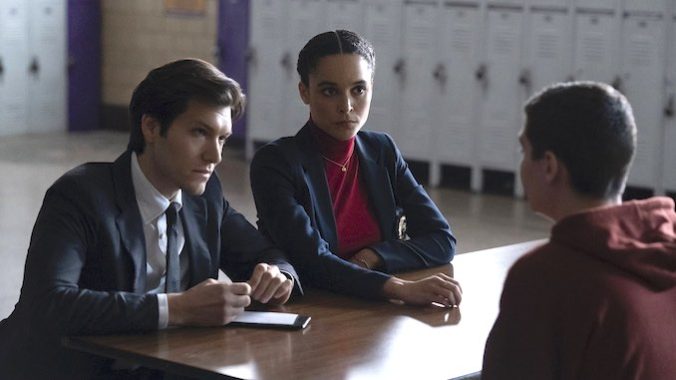Peacock’s Detective Drama The Calling Is a Prime Example of Peak TV Mediocrity
Photo Courtesy of Peacock TV Reviews The Calling
Initially, the appeal of streaming was its freshness. It offered a stylized, curated quality of television that could not be produced or consumed in the same way anywhere else, and proved a relentless success. Network television had become stale to enough audiences to warrant investing in what promised to be the future; on-demand, ad-free programming that was more eye-catching than the average cable show. As time went on, every network and studio invested in their own streaming platform, siphoning off talent and audiences that weakened the potency of Netflix and Prime Video’s initial appeal—but every nascent service that popped up needed original programming to flesh out its library.
This is why streaming services launch with a cavalcade of broadly-pitched, hopeful “system-sellers” that open the door to regular releases of average-to-good quality, because at the end of the day, a lot of money has been sunk into these platforms, and it’s not possible to scale back. The flashiness that streaming initially offered has now dulled, and while the type of content we’re offered has changed, it’s not been as persistently game-changing as the break from cable promised, landing us close to where we began. Welcome to Peak TV, ladies and gentlemen, the tagline is: Who Gives a Shit?
And that’s how you get The Calling, a sincere, high-brow detective show engaging with real ideas, with stalwarts of old-era entertainment behind the camera, ready to prop up Peacock’s original content—and it’s the most aggressively average show out there. Showrunner David E. Kelley has sanded down most of his comedic instincts but retained just enough of his peculiar character-writing in adapting the Avraham Avraham novels, centering on the titular Jewish Orthodox NYPD detective, played by Isreali-German actor Jeff Wilbusch. He’s aided by his new partner Janine (Juliana Canfield), who’s fascinated by the deep spirituality and alternative methods Avraham solves crimes with, which are regarded with an irritated if respectful eye-rolling from Detective Malzone (Michael Mosley, for once not playing a piece of shit) and Captain Davies (Karen Robinson). Avraham doesn’t do it by the books, but he does get the job done.
It’s Avraham’s unique police work that helps The Calling stand out. His deep understanding of morality and human nature helps him hone in on motivation and instincts to a startling degree, while his intense interrogations have him boring into a suspect’s soul to unravel them from the inside. Having any moral or behavioral code that’s distinct and separate to conventional NYPD practices will always be a good thing, and like Under the Banner of Heaven before it, Avraham proves being a committed, religious detective brings new layers to a character who seek the restoration of justice and order. (Even though Avraham can also do sick martial arts moves. Unsure how this relates to Orthodoxy.) His eye for details both physical and metaphysical doesn’t feel like a cheap trick from a cheating mystery writer; often it bolsters Avraham’s peculiarities in interesting and funny ways. “The human fingertip is a profoundly perceptive organ,” he once comments, to which the only reasonable answer should be “… Sure?”
It’s not just Kelley’s writing that feels stripped back; this first season’s direction feels like it’s aping the clinical, distant feeling of director Barry Levinson’s opening two episodes, which are in peak late-era filmmaker mode. At eight episodes, the show wisely decides to split its time between two four-episode arcs, but similar threads between them stop feeling like the Universal Archetypes of Our Human Species and more like Weak Writing. The initial suspect representing the fragile male ego and unwarranted aggression feels really resonant until we meet its double in the second half, and as per the rule of diminishing returns, the second batch of suspects feels a lot less compelling and a lot more soapy than the first.
The main problem with The Calling is that both mysteries don’t unravel in a particularly inventive or interesting way. There are isolated moments of daring police work—ones that are both lauded or reprimanded—but there isn’t much momentum pushing us through the episodes, often escalating in unconvincing, ineffective ways that make us feel like we’re wheel-spinning and not progressing. Captain Davies even comments that Avraham and Janine haven’t managed to gather any hard evidence, her irascible police chief characterization covering up the thin plotting underneath.
The characters have been provided with robust enough backstories and personalities, and are played commendably by Wilbusch and Canfield, but The Calling never stops feeling small in its execution—both mysteries restrict themselves to two couples/families as their suspects, flitting back and forth until one is exhausted and a clear, unsurprising culprit is found. Even though it’s a worthy angle for a detective, Avraham’s instinctual, impulse-based style does eventually run out of dramatic mileage, and viewed as a whole, nothing else is unremarkable about The Calling. Even when the second mystery upgrades the amount of rooms detective work is done in from three to four, it feels like the scope of the series was too minor to have the impact it strives for. Another attempt at changing the game; another example of the bar staying stagnant.
The Calling premieres Thursday, November 10th on Peacock.
Rory Doherty is a screenwriter, playwright and culture writer based in Edinburgh, Scotland. You can follow his thoughts about all things stories @roryhasopinions.
For all the latest TV news, reviews, lists and features, follow @Paste_TV.